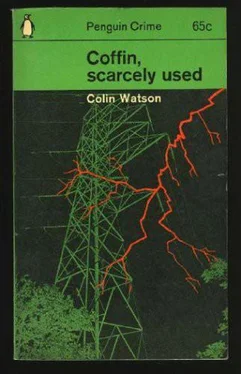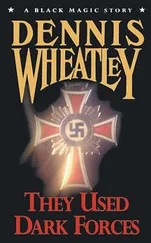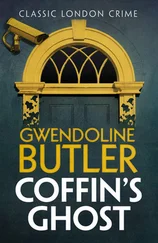“Do you know where she went when she left for the night?”
“No idea at all, old man. It wasn’t my business.”
“Come off it.” For the first time, Gibbins, the local inspector, entered the conversation. “This village is no bigger than my backside. Anyone coming here wouldn’t have a dozen houses to choose from to stay the night in. Somebody’s bound to know where the woman went. And I know as well as you do that the gosbip out here is spread in the bars like sawdust. Now just you tell this gentleman what you’ve heard, my lad.”
The landlord glanced resentfully at Inspector Gibbins’s whisky. “I tell you I don’t tittle-tattle with the peasantry,” he said. “They always keep to the Smugglers’ Browserie—what used to be the bar—ever since we did the place out and stopped them trying to bring goats along with them. Percy always serves them, not me.” He trotted to the hatch, evidently a sort of control centre, and shouted “Per-CEEE!”
The summons brought forth, after a minute or so, a huge, droopy-chopped mental deficient who kept wringing an imaginary dish-cloth and shaking his head. Persistent but kindly interrogation by Gibbins won the news that the ‘lady from away’ had been seen more than once bound in the direction of Avery Woodside, but that none knew precisely upon whose bed ‘them pretty ’aunches do ’ave steamed’.
Inspector Gibbins seemed satisfied and dismissed the mountainous haunch-fancier with thanks. He asked Purbright if he wished to know anything further.
“Was Mrs Carobleat never in the company of anyone here? Did you never see her strike up a conversation over a drink, say, or accept a lift in a car?”
The landlord was certain that he had not.
“Did you know her to make a telephone call at any times?”
She made no calls herself, but at her request he had occasionally rung for a taxi or to confirm the time of a train.
When the two policemen left the hotel, Gibbins pointed along the road to their left. “Avery’s that way,” he said. “I didan’ try to drag anything more out of Perce because what he did say leaves us with a very short choice. Come on.”
They soon drew level with a farm entrance. “Nothing there,” said Gibbins. “There’s just the old man and his sister and a stockman who lives in. They don’t know anybody.”
“What’s that place?” Purbright asked, nodding toward a house set in wooded grounds behind a wall that extended along the opposite side of the road.
“Do you have squires in your part of the world?”
Purbright shook his head. “Hardly. Our upper crust sank into the gravy quite a while since. Why, is that a manor? In the feudal sense, I mean?”
“It is. And wheezing in the middle of it somewhere is a real squire.”
“Paralysed with a surfeit of droit de seigneur ?”
“Poxed and well-nigh boxed,” confirmed Gibbins. “I doubt if your Mrs Whatsername would have wanted to see him; not unless she had an interest in morbid pathology.”
“We’re not calling, then?”
“Only if we have no luck farther on.”
They reached a road fork, in the centre of which stood a public telephone kiosk.
“That’s just a track,” Gibbins said of the right-hand lane. They entered the other and began to walk more briskly. Neither spoke until they came within sight of a small house of red brick.
Gibbins said: “We’ll have a word with Mrs Battle. Considering the number of kids she has, I wonder she has time to notice anything that’s not on the stove or the clothes line, but it’s amazing how much she finds out. Perhaps Battle tells her. She’s not been this side of her gate since old Kennedy dropped dead from his delivery van in the road here one Thursday morning just after the war and she came out and stepped over him to get the bread she’d been waiting for.”
Walking round the side of the house, they encountered Mrs Battle picking one of the yougest of her children out of the hen run. Purbright thought she looked hostile and excitable, but Gibbins greeted her familiarly and she waddled ahead of them into the house.
After some small-talk in a dialect that Purbright found difficult to follow but which was obviously zestfully indelicate, Mrs Battle began to give answers to Gibbins’s inquiries into the passage of strangers thereabouts.
Her replies, translated one by one to Purbright by his colleague, were to the effect that a woman answering Joan Carobleat’s description had indeed walked by the house on several occasions. She was a visitor, according to Mrs Battle’s observations from her bedroom window, to the house of Mr Barnaby, the gentleman from London way who had bought the next cottage down the road—the last habitation before Avery Woodside—and who enjoyed such other advantages as a morning help from Polstead, a motorcar, fishing rights in the meadowlands of poor palsied Squire, and the nocturnal companionship of various anonymous but drattedly giggly young women.
Was Mr Barnaby likely to be at home now? She thought it highly probable, for she had seen the headlamp beams of his big motor-car flash across her bedroom ceiling late last night and had heard his garage door roll shut. Since then, no traffic had passed but a van or two. Mr Barnaby’s big motor-car certainly had not emerged again. It made a sinful noise, as though bound for race tracks and hotels, and she would not have missed it, even in her sleep.
Had the morning help called that day, as usual? No, she hadn’t, now that it came to be mentioned, not that she came absolutely every day because her husband sometimes got took extra bad.
What sort of a man to look at was Mr Barnaby? She had never looked, save at his lordly passing awheel when she had got no more than a fleet glance at his face, which was dark, she thought, and whiskered, and proud.
Whiskered? Purbright reminded Gibbins that the man who had bought electric cable from Barr and Cranwell, Ltd., Radio and TV, Ludlow, to which a fragment of yellow adhesive tape had led them earlier that day, had also been described as bearded.
How did Mr Barnaby earn a living and pass his time? She had heard nothing of his employment, but Battle thought (for what his opinion was worth) that their neighbour was like to be a gentleman just out of either Parliament or prison and writing a book about it.
After some further conversation in the steamy gloom of Mrs Battle’s nappie-festooned kitchen, the two policemen took their leave.
When they arrived at Mr Barnaby’s unexpectedly ostentatious gateway, Gibbins asked Purbright: “Do you want to see this character on your own? He’s not one of my parishioners; I might just be in the way.”
“No, you come along in,” said Purbright. “I’m not at all sure what I’m going to say to him, anyway. At least you can fill awkward pauses by asking to see his licence, or soliciting for the Boot and Shoe Fund or something. Damn it, you can’t loiter at gates in this weather.”
They made their way through the dead, tangled garden and Gibbins knocked on the front door. “The back would be more to the point as a rule,” he observed, “but this chap’s a foreigner; he probably hasn’t bothered to nail up the front door yet awhile.”
There was no sound within the cottage. Purbright knocked, again without result.
“You go round and try the back,” suggested Gibbins. “I’ll see if his car is still in the garage. It’s not often old Mother Battle’s espionage is at fault.” He strode off towards the shed.
Purbright knocked with his knuckles on the back door and tried the handle. Then he moved to one of the two flanking windows. Inside was a long, clean kitchen.
A few moments later, Gibbins reappeared. “Wherever he is, he hasn’t taken the car,” he announced. “It’s still in the garage.”
Читать дальше












